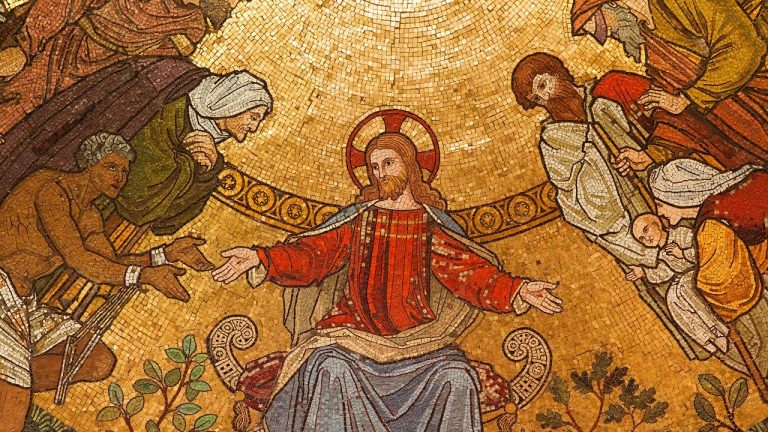THIRD SUNDAY OF LENT, YR A
Exod. 17:1-7; Ps 95
Rom. 5:1-11; Jn 4:5-42
JESUS THE LIVING WATER THAT REVIVES US
The bible indisputably has an overload of spiritual imagery that tell of the relationship between God and his people. One of these conspicuous biblical images is Living Water. Considering that the middle East is largely a desert area, water is a very scarce and precious commodity. Without rain, the mountains wore brown and dry coverings and all vegetation seem to have died.
But a season of rain revives everything to life. The mountains spring up with life with a loud beauty of greenery of flowers, meadows and vegetation.
In our gospel today, Jesus has some dialogue with the Samaritan woman and promises to give her living water. What does Jesus mean when he uses the term living water?
The first understanding of living water is water from rain, flowing from natural springs. It is basically the water that moves or bubbles showing signs of life or movement. This is considered to be from God and in fact, He is the source of living water. (Jeremiah 2:13). This is water that can be drunk. It refreshes and revives. It quenches thirst.
Before the dialogue with Jesus, we read that the woman came to the well at noon. Now this is strange because, it is not normal to go to the well at noon. That is done early in the morning or late afternoon. This is indicative of the life of one who has been isolated and rejected by the society. One who lives her life in loneliness and fear. She is the kind of person nobody would like to associate with. Like the Samaritan woman, many of us live lives of isolation, rejection and loneliness. We feel unappreciated. We are shunned. We find ourselves alone and lonely many times. And we are almost giving up on ourselves but Jesus comes to refresh and revive us. He comes to give meaning to our lives. The Living water comes to heal us of the feelings of rejection. He does not hold our sins against us. He does not call us by our sins. He takes them, nail them to the cross and washes us clean by the water that flowed from his side. (Jn 19:34). Are you ready to come to Jesus now? Like the woman, pray to him “Lord give me this living water”.
The second understanding or use of living water which I wish to consider is water used for ritual bath in the Temple. It a pool of water in which a person will cleanse himself before he offers sacrifice. This is to make sure that you are clean in order that your sacrifice is acceptable to the Lord. The water in the pool, which is called the “mikvah”, is to be living water in the sense that it should come from a spring or rain.
The third dialogue between the woman and Jesus, was about the place and kind of worship which is accepted to God. The woman, a Samaritan, pointed out that the Jews frowned upon their worship because it was outside Jerusalem. Jesus seems to agree but that was not important because “the hour is now coming, and is now here when true worshipers will worship the Father in spirit and in truth…” (Jn 4:23-24). By this, Jesus the Living Water brings some newness to worship. He comes to make our worship and sacrifice perfected and acceptable to the Father. What does this mean? Worship must first of all begin from a sincere search for God. This search for God must be a passionate pursuit. It must not be confined to a geographical area or rituals and traditions. It must come from your heart otherwise the ceremonies are of no essence and benefit. What remains of your worship or faith if it is stripped of the cloak of your denomination, tradition or ceremonies? May Jesus touch us. With and through him may our worship and be acceptable to the Father.
The third use of the living water is for bridal bath. Like the cleansing before sacrifice, Jewish women also take a bridal bath and their bodies oiled before marriage.
The second dialogue with the woman concerns her personal life. Jesus asked her to call her husband but she was truthful to say that she did not have one. She has had five and the one she was with was not her husband. When we put all the men together, they number six (6). The number six is a symbol of imperfection and human weakness. The woman was still in an imperfect state. There is another thing; the well is a place for courting or finding love. The woman has lived her life in an imperfect way. All the suitors were not enough. Jesus, the seventh man, is the divine intervention in her personal life. Will she accept him who fulfils all her yearnings?
Jesus sits at the well of the Eucharistic celebration today and he wants you to fall in love with him. Will you? He perfects and fulfils our desires and yearnings. He strengthens our weaknesses. What is your response today? Jesus is thirsting for a deeper relationship with you – a relationship that is everlasting. Will you fall for his advances of love towards you?
May this Lenten season make us ready for the Living water to wash us of our weaknesses, refresh and revives us as we give fitting worship to the Father.
God bless you.
By Fr. Delight Arnold Carbonu




